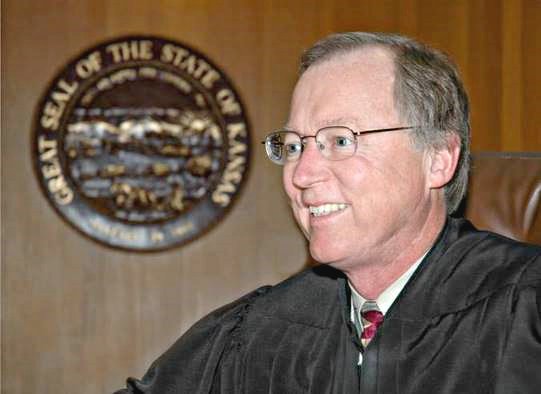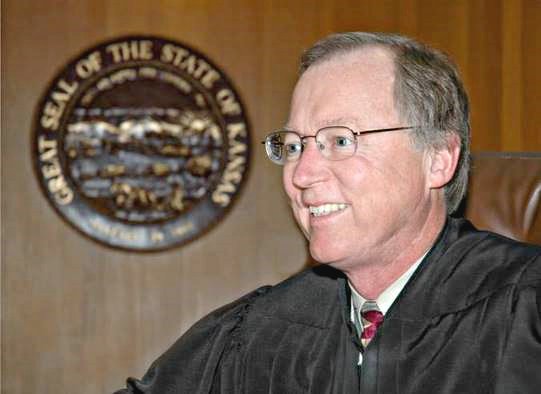The Honorable Michael Malone, a native of Rice County and graduate of Chase High School, considers himself “the luckiest judge in Kansas.”
After 32 years on the District Court bench at Lawrence and presiding over 200 jury trials and thousands of other proceedings, Judge Malone retired in 2014 to accept a senior judge position with the Kansas Supreme Court. Although there are 12 semi-retired senior judge positions, seven are assigned to trial court work at the district court level and four are assigned to appellate court work at the Court of Appeals.
When Malone agreed to serve as a senior judge, he stepped into a newly created position on the state supreme court after one of the justices was appointed to the federal court of appeals. Because of a heavy workload involving school finance, death penalty cases, etc., Brother Mike was asked to sit full-time in the justice’s chair until the vacancy was filled by Governor Sam Brownback. His assignment as the lone senior judge to the state’s highest court has continued on a part-time basis to this day – in many cases when there is a recusal (self-disqualification) by one of the justices because of a conflict. Since September 2014, he has sat on more than 150 cases, and has written and published more than 20 opinions for the supreme court.
“Working with the justices is immensely rewarding,” Senior Judge Mike says. “They are men and women of the highest character and scholarship who are passionately dedicated to serving the rule of law. I have nothing but the greatest respect and admiration for each and every one of them.”
Malone grew up on a central Kansas farm located between the towns of Chase and Alden. He says he went to K-State because the people in his high school class either went to KSU or stayed home and farmed. He chose to pledge Delta Upsilon Fraternity at the end of his sophomore year because of the influence of DU Brother Tom Hawk, who served together with him in Student Senate. He was also a member of Blue Key senior honorary, was DU alumni relations chairman, Army ROTC, ran unsuccessfully for senior class president, and managed Brother Tom Hawk’s successful campaign to be elected Favorite Man on Campus.
He was attracted by the fraternity’s emphasis on values and the DU motto, “Justice our Foundation,” especially since he always wanted to go to law school. He is a 1973 graduate of the Kansas University School of Law where he later served as an adjunct professor for more than 30 years.
At age 34, Mike was appointed District Court Judge by Governor John Carlin. He was retained for eight terms. During his career, he estimated that for every hour he spent on the bench in the courtroom, there are about 10 hours spent reading, writing, researching and simply thinking. He emphasizes that judges should not become egocentric and victims of the “black robe disease.”
“We are not important,” he says. “The position, which serves the rule of law, is what is important.”
As a district judge, Malone said that every time he went into the courtroom he knew that the case before him was the most important event in the life of the individual standing before him. He didn’t always see people in their best light and certainly not in their best behavior.
However, he begs to differ with many of the general public who believe in retribution or punishment in its harshest form.
“Sentencing someone to prison, even though the law requires it, is really a sad thing to do,” he says. “I tried to give convicted defendants some encouragement. The last thing I wanted to do was send someone out feeling they weren’t any good. That doesn’t do them or society any good.
“In my 32 years as a trial judge, I don’t think I saw more than a handful of malicious criminals,” he adds. “What I saw were people with a life story. People who are addicted to some sort of drug or alcohol and make decisions based on those addictions. Or they are people who just make mistakes. Most people don’t try to go out and make mistakes.”
Judge Malone concludes with a final observation on his time as a trial judge: “While serving the law is first and foremost, I believe the law should treat defendants with dignity,” he stresses. “Pass sentence if you must, but don’t judge them at their worst.”





